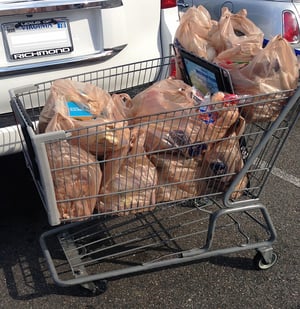 According to the EPA, between Thanksgiving and New Year's Day American household waste will increase by more than 25%. Holiday food, packaging, shopping bags, wrapping paper, and other items will contribute an additional 1 million tons a week to our landfills. As we prepare to feast and give thanks we would be remiss not to remember what happens to food waste (and other organic materials) in the landfill. As food waste decomposes in the landfill it releases methane, a greenhouse gas that is at least 28 times more potent than carbon dioxide.
According to the EPA, between Thanksgiving and New Year's Day American household waste will increase by more than 25%. Holiday food, packaging, shopping bags, wrapping paper, and other items will contribute an additional 1 million tons a week to our landfills. As we prepare to feast and give thanks we would be remiss not to remember what happens to food waste (and other organic materials) in the landfill. As food waste decomposes in the landfill it releases methane, a greenhouse gas that is at least 28 times more potent than carbon dioxide.
For the purpose of this week's sustainability tip, we'd like to focus on ways to limit your food waste this Thanksgiving. It's not just about food and hunger. It's also about money. Americans throw away roughly $165 billion in uneaten food every year, and it is estimated that about $293 million of that waste will happen during Thanksgiving (and that's just in turkey).
Here are some tips to limit your food waste this Thanksgiving.
1) Portion control. Serve smaller portions, initially. You can always go back for seconds or thirds but only place on the plate what you know you can finish.
2) Coordinate your recipes with friends and family so you don't end up with 13 green bean casseroles or 7 turkeys. A little communication and planning can go a long way to reduce food waste.
3) Freeze your leftovers. Some people can't eat leftover turkey sandwiches for 13 consecutive days and food left in the refrigerator too long inevitably ends up being thrown away. If you freeze your leftovers you can eat them at a later date or turn vegetables and meat scraps into homemade soup or broth.
4) Eat less meat. But more turkey? The average American could cut their diet's environmental impacts in half just by eating less meat and dairy. For many (including myself), however, it would not be Thanksgiving without turkey. Come to find out turkey and other poultry require less land and have lower associated greenhouse gas emissions than beef, lamb or ham. So eat less meat but more turkey!
5) Compost. If you can't eat it, freeze it, leftover it, reduce it, or donate it.... compost it. Send your food scraps to a local compost facility (Honey Wagon Organics). Properly composting helps make healthy soils, improves water retention, supports native plants and reduces the need for fertilizers and pesticides.
Paul Abling is the Marketing and Communications Director at Walking Mountains Science Center.
Sources:








